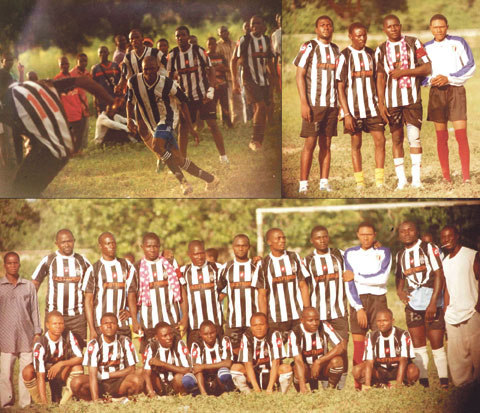The author brought his passion for football with him from Nigeria to TU Delft, but the beautiful game isn’t so beautiful when you’re running around in Holland’s hurricane winds and arctic cold wearing a pair of shorts.
I don’t know how my fellow Africans who play professionally in Holland, England, Germany, Russia…do it, but as for me it’s just too damn cold to play the beautiful game in these parts. In fact, come 17:00 at night and it’s too cold for me to even leave my apartment unless absolutely necessary – and by absolutely necessary I’m talking about a fire or something!
When I first arrived in Delft last September to start my MSc studies, one of the first things I did was seek out a football club to join – TU Delft’s Ariston 80. What a change that club was from my local village club – Milo FC – back home in Nigeria. What a change from those sweltering days playing under the hot sun for Milo FC. Seems like another world now.
Playing for Milo FC was full of passion and pride. Although the club’s best players earned salaries of about 13.00 euro per month, the club’s business-like approach was summed up in the club slogan: ‘Wassan Kweleow’ – the business of football. Funded by the villagers and local politicians, Milo FC employed a manager who also had to serve as physio, trainer, kit man, treasurer, disciplinarian and match organizer.
Training sessions at Milo FC were serious yet replete with the training pitch clowning footballers are renowned for. Serious, but always with a comical side, like when players came late: the manager would then ‘ask’ the latecomers to be so kind as to jog 20 times around the pitch, pay a fine and hand wash the entire team’s jerseys after a match.
Every village boy with some talent played for one of Milo FC’s two teams. Matches were played against other regional village teams. Religion also played a role at Milo: the ritual was to start each training session by praying to God for protection. The manager then split us into two teams based on hierarchy: the younger, less experienced players against the older more experienced ones. Because we had no training jerseys, one team played bare-chested under the sizzling Agyaragu sun. Arguing, cursing and fighting for the ball, sometimes tempers would flare, forcing the manager to discipline the culprits by making them buy drinking water for the entire team after training.
Match day
Milo FC practiced every day except Fridays, which was our village market day, when we’d all meet up to discuss the week’s training or arrange matches, while gulping gourds of fresh palm wine. Oh how I miss those times! On match day the entire village assembled to cheer us on to victory. The unwritten rule of Nigerian village football is that the visiting team is allowed to pick the match referee, who is usually one of the team’s officials, and the visiting team also always receives monies called a ‘Match Guarantee’, of around 35.00 euro, paid to them by the host team and meant to cover the visiting team’s transportation costs.
In contrast, my football experience at Ariston 80 has been very professional, although rather serious for pure enjoyment purposes. There seems to be a bit too much emphasis of technique, style and physical exercises here, like one would expect in the football academies, and hardly ever time for just playing free flowing training ground football, like at Milo FC.
At Ariston 80, the warm up exercises are business-like and followed by a player’s weekly performance assessments based on game stats. It’s all so much better organized here – players can take showers and have tea, coffee or cold drinks before and after training. And trainings are held at a state of art sports facility, complete with lights, branded kits, equipment and an AstroTurf pitch, all of which combines to make one feel like a professional football star on TV.
The Ariston 80 experience was wonderful yet also complex, owing to the biting cold weather and language barrier, as well as to the different football styles and techniques favored here. Ariston 80’s players and coaches do have very cordial relationships and are open to criticism, which is so different from my home village football experience, where the trainer-manager is king and no one dares contradict or challenge his authority.
Compared to Milo FC however, the skill level and ball play here feels a bit too orchestrated, and players are given little freedom to experiment and express themselves with the ball. Yet I love the organization and facilities, commitment and attitude of the Dutch players and coaches.
So while it was a truly new and wonderful experience playing at Ariston 80, the pressures of schoolwork and the freezing Dutch climate have left me cold. Now I stay indoors as soon as night falls, with my radiator turned up to the max, content to kick a football in my mind only, while praying earnestly for summer to come so I can once again enjoy playing the beautiful game.



Comments are closed.